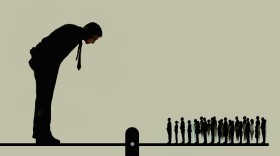
Shankar Vedantam
Shankar Vedantam is NPR's social science correspondent and the host of Hidden Brain. The focus of his reporting is on human behavior and the social sciences, and how research in those fields can get listeners to think about the news in unusual and interesting ways. Hidden Brain is among the most popular podcasts in the world, with over two million downloads per week. The Hidden Brain radio show is featured on some 250 public radio stations across the United States.
Before joining NPR in 2011, Vedantam spent 10 years as a reporter at The Washington Post. From 2007 to 2009, he also wrote the Department of Human Behaviorcolumn for the Post.
Vedantam and Hidden Brain have been recognized with the Edward R. Murrow Award, and honors from the American Association for the Advancement of Science, the Society for Personality and Social Psychology, the International Society of Political Psychology, the Society of Professional Journalists, the National Association of Black Journalists, the Austen Riggs Center, the American Psychoanalytic Association, the Webby Awards, the Pennsylvania Associated Press Managing Editors, the South Asian Journalists Association, the Asian American Journalists Association, the Pennsylvania Newspaper Association, the American Public Health Association, the Templeton-Cambridge Fellowship on Science and Religion and the Rosalynn Carter Mental Health Journalism Fellowship.
From 2009 to 2010, Vedantam served as a fellow at the Nieman Foundation for Journalism at Harvard University.
Vedantam is the author of the non-fiction book The Hidden Brain: How Our Unconscious Minds Elect Presidents, Control Markets, Wage Wars and Save Our Lives. The book, published in 2010, describes how unconscious biases influence people.
Outside of journalism, Vedantam has written fiction and plays. His short story-collection, The Ghosts of Kashmir, was published in 2005. The previous year, the Brick Playhouse in Philadelphia produced his full-length comedy, Tom, Dick and Harriet.
Vedantam has served as a part-time lecturer at Harvard University and Columbia University. He has also served as a senior scholar at the Woodrow Wilson International Center in Washington.
-
Schadenfreude is an emotion most people try to hide. But research shows people are more likely to exhibit this feeling if they are die-hard fans of a particular sports team.
-
Violent crimes committed by Muslims are much more likely to be reported as "terrorism." And that has disturbing consequences for the way Muslims are perceived.
-
Decades ago, a group of women accused a prominent playwright of sexual misconduct. For the most part, the complaints went nowhere. In 2017, more women came forward. This time, people listened.
-
A recent study finds companies whose CEOs committed a personal indiscretion — such as infidelity, substance abuse and dishonesty — experienced a decline in shareholder value.
-
This week on Hidden Brain's radio show, we tackle a big topic: power. From our conflicted feelings toward the powerful, to the ways we gain and lose power ourselves, and how power can corrupt.
-
Researchers find that during extra innings, baseball umpires make calls in a way that tends to end games sooner. This seems to be because umpires aren't given additional money to work extra innings.
-
It doesn't just keep them entertained. New research highlights an unexpected positive impact — and also shows that when a parent sings to a child, the parent can benefit, too.
-
How many ads have you encountered today? On this week's radio replay, we discuss the insidiousness of advertising in American media.
-
The researchers believe this is because politicians in gerrymandered districts are less likely to advocate for goods on behalf of their constituents.
-
Workers with a strong sales record were likely to be promoted into managerial positions, yet they tended to be worse at managerial jobs than those who were low-performing workers.








